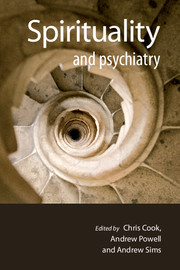Book contents
- Frontmatter
- Contents
- List of contributors
- List of tables, boxes and figures
- Foreword
- Preface
- The Spirituality and Psychiatry Special Interest Group of the Royal College of Psychiatrists
- 1 Spirituality in psychiatry
- 2 Assessing spiritual needs
- 3 Psychosis
- 4 Suicide
- 5 Child and adolescent psychiatry
- 6 Psychotherapy
- 7 Intellectual disability
- 8 Substance misuse
- 9 Neuroscience of the spirit
- 10 Spiritual care in the NHS
- 11 The transpersonal perspective
- 12 Religion and religious experiences
- 13 Pathological spirituality
- 14 Ageing
- Index
8 - Substance misuse
Published online by Cambridge University Press: 02 January 2018
- Frontmatter
- Contents
- List of contributors
- List of tables, boxes and figures
- Foreword
- Preface
- The Spirituality and Psychiatry Special Interest Group of the Royal College of Psychiatrists
- 1 Spirituality in psychiatry
- 2 Assessing spiritual needs
- 3 Psychosis
- 4 Suicide
- 5 Child and adolescent psychiatry
- 6 Psychotherapy
- 7 Intellectual disability
- 8 Substance misuse
- 9 Neuroscience of the spirit
- 10 Spiritual care in the NHS
- 11 The transpersonal perspective
- 12 Religion and religious experiences
- 13 Pathological spirituality
- 14 Ageing
- Index
Summary
Substance misuse psychiatry is concerned with what happens when people use psychoactive substances in such a way that they cause harm to themselves and others. It is, therefore, a field of clinical practice and scientific enquiry that is concerned with people's relationships with themselves and others and the wider order of things, but especially with the object of their ‘addiction’. Necessarily, this engages it with spiritual concerns and in fact the field has a history of engaging with spiritual as well as medical ways of thinking. The definition of spirituality offered in chapter 1 (p. 4) emerged from a study of the addictions literature.
Much has been said about exactly how behavioural patterns of substance misuse should be defined. Such definitions are largely beyond the scope of this chapter, but of central importance to the field today is the concept of the dependence syndrome, which has influenced both ICD–10 (World Health Organization, 1992) and DSM–IV (American Psychiatric Association, 1994) classifications of substance use disorders. This has largely replaced, or else has come to define, the concept of addiction in clinical practice and scientific research. It is a bio-psychosocial understanding of addiction that has now withstood the test of several decades of research. It has the benefit of clarifying what addictive behaviour is about so as to enable us to see both what the spiritual issues entailed in that behaviour might be, and also what the bio-psychosocial correlates of spirituality are.
For example, the element of subjective compulsion, defined within the dependence syndrome in such a way as to include both craving and impaired control over substance-related behaviour, touches on important concerns of both Buddhist and Christian spirituality (Groves & Farmer, 1994; Groves, 1998; Cook, 2006). Because these traditions each have something important to say about the spiritual nature of addiction, it is not surprising that Christian, Buddhist and other faith-based treatment programmes have been founded as a response to the suffering with which addiction is associated. On the other hand, the model of the dependence syndrome reminds us that there is a bio-psychosocial dimension to spiritual problems. This is true not only within the field of substance misuse but in all areas of human experience.
- Type
- Chapter
- Information
- Spirituality and Psychiatry , pp. 139 - 168Publisher: Royal College of PsychiatristsPrint publication year: 2009

